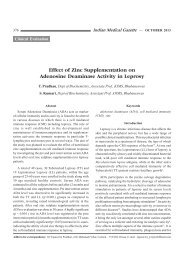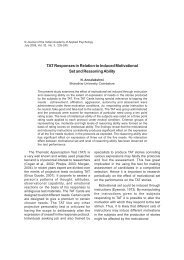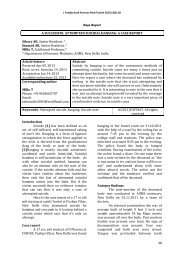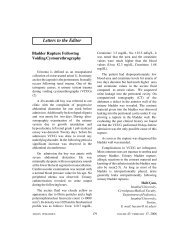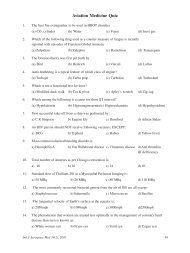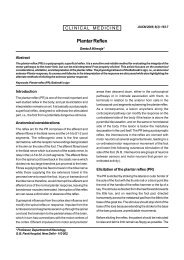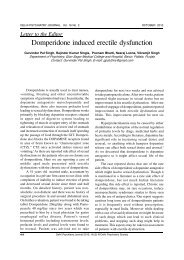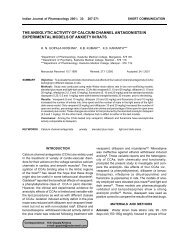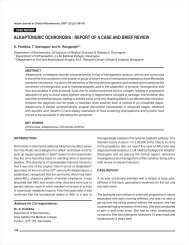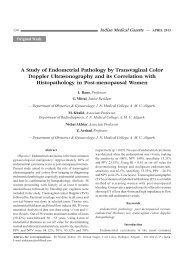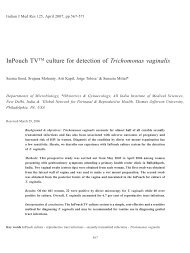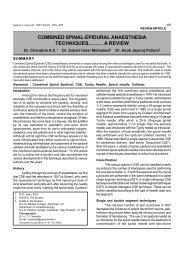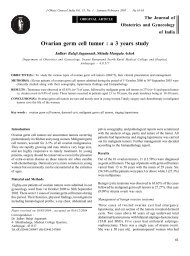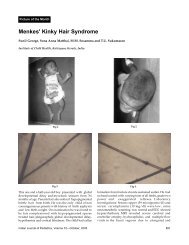Critics and Sceptics of Medico-legal Autopsy - medIND
Critics and Sceptics of Medico-legal Autopsy - medIND
Critics and Sceptics of Medico-legal Autopsy - medIND
Create successful ePaper yourself
Turn your PDF publications into a flip-book with our unique Google optimized e-Paper software.
J Indian Acad Forensic Med. October-December 2013, Vol. 35, No. 4 ISSN 0971-0973<br />
Review Research Paper<br />
<strong>Critics</strong> <strong>and</strong> <strong>Sceptics</strong> <strong>of</strong> <strong>Medico</strong>-<strong>legal</strong> <strong>Autopsy</strong> Guidelines<br />
In Indian Context<br />
*Basant Lal Sirohiwal, **Luv Sharma, ***P.K. Paliwal<br />
Abstract<br />
Medicine is governed by set code <strong>of</strong> principles which are followed by every Medical pr<strong>of</strong>essional<br />
during his medical practice. Doctors dealing with medico-<strong>legal</strong> work, bear a further burden <strong>of</strong> not only<br />
abiding by these rules but also by being vested with deciding authority in such matters. World over,<br />
medico-<strong>legal</strong> authorities issue guidelines <strong>and</strong> rules, which vary in procedural content from nation to<br />
nation. In India, the basic guidelines are almost the same, though differences in their applications differ<br />
from state to state. Comparison <strong>of</strong> both Indian <strong>and</strong> Western scenarios on this issue lay bare a basic<br />
difference. Uniform medico-<strong>legal</strong> guidelines <strong>and</strong> st<strong>and</strong>ard protocols make medico-<strong>legal</strong> work less<br />
complicated in practice. In India, however, stark differences exist even amongst states as far as<br />
application <strong>of</strong> medico-<strong>legal</strong> guidelines is concerned. Consequently, no comprehensive unanimity exists in<br />
medico-<strong>legal</strong> work in India. This paper attempts to make a critical <strong>and</strong> sceptical analysis <strong>of</strong> this problem<br />
with a few suggestions for the streamlining <strong>of</strong> medico-<strong>legal</strong> work in India.<br />
Key Words: <strong>Medico</strong>-<strong>legal</strong> guidelines; Differences; Manual, Medical Pr<strong>of</strong>essional<br />
Introduction:<br />
Whenever a patient comes to a general<br />
practitioner, he should abide by some<br />
guidelines, both in the interest <strong>of</strong> the patient as<br />
well as himself. These become more important<br />
particularly in medico-<strong>legal</strong> subjects. All states in<br />
India have different formats for medico-<strong>legal</strong> <strong>and</strong><br />
postmortem examination with almost identical<br />
content, but different autopsy guidelines are<br />
being followed in different ways in each state<br />
whose critical <strong>and</strong> skeptical analysis has been<br />
attempted in this article.<br />
Legal Concept:<br />
The concept <strong>of</strong> a medico-<strong>legal</strong> autopsy<br />
has been mentioned in the sections 174 <strong>and</strong> 176<br />
Code <strong>of</strong> Criminal Procedure (Cr.P.C.) during<br />
investigations <strong>of</strong> a suspected death. [1]<br />
Objects <strong>of</strong> a <strong>Medico</strong>-Legal <strong>Autopsy</strong>:<br />
The objective <strong>of</strong> the post-mortem<br />
examination is to establish the identity <strong>of</strong> a body,<br />
when not known, to ascertain the time since<br />
death <strong>and</strong> the cause <strong>of</strong> death; <strong>and</strong> whether the<br />
death was natural or unnatural <strong>and</strong> if unnatural,<br />
whether it was homicidal, suicidal or accidental.<br />
Corresponding Author:<br />
*Pr<strong>of</strong>essor,<br />
Department <strong>of</strong> Forensic Medicine,<br />
Pt. B. D. Sharma PGIMS, Rohtak<br />
E-mail: drbasantsri@gmail.com<br />
**Pr<strong>of</strong>,<br />
***Senior Pr<strong>of</strong> & HOD<br />
DOR: 14.05.13 DOA: 1.11.13<br />
In case <strong>of</strong> newly born infants, the<br />
question <strong>of</strong> live birth <strong>and</strong> viability assume<br />
importance <strong>and</strong> should be determined. [2]<br />
The term "postmortem examination" is<br />
<strong>of</strong>ten used as a simile for "autopsy." Basically, it<br />
is not.[3] A postmortem examination means only<br />
what it says that the body was examined after<br />
death. It can mean <strong>and</strong> <strong>of</strong>ten does mean that the<br />
physician merely looked at the body, fully<br />
clothed, or that he "viewed" the body at a funeral<br />
home or in a morgue.<br />
A complete autopsy involves opening all<br />
body cavities <strong>and</strong> all organs <strong>of</strong> the trunk, chest,<br />
<strong>and</strong> head. [3] In all cases, a complete <strong>and</strong> not a<br />
partial examination are more necessary in this<br />
country on account <strong>of</strong> the imperfectness <strong>of</strong> the<br />
preliminary evidence as to the possible cause <strong>of</strong><br />
death. [4] However, <strong>legal</strong> authorities have <strong>of</strong>ten<br />
made exceptions to this rule by commenting that<br />
it is not at all necessary for the autopsy surgeon<br />
to open all the cavities in the body <strong>of</strong> the<br />
deceased, where the cause <strong>of</strong> death is<br />
otherwise ascertainable.<br />
The postmortem report is still reliable<br />
even if no x-ray was done. This is exemplified in<br />
the celebrated murder case <strong>of</strong> Smt. Indira<br />
G<strong>and</strong>hi late Prime Minister <strong>of</strong> India, The Apex<br />
court stated in its judgment that undisputedly<br />
Smt. Indira G<strong>and</strong>hi died as a result <strong>of</strong> the gun<br />
shot injuries inflicted by Beant Singh <strong>and</strong><br />
Satwant Singh with their service revolver <strong>and</strong><br />
carbine respectively. In view <strong>of</strong> such clear<br />
evidence about the cause <strong>of</strong> the death, the post-<br />
373
J Indian Acad Forensic Med. October-December 2013, Vol. 35, No. 4 ISSN 0971-0973<br />
mortem or a fuller postmortem examination<br />
loses all its significance. It becomes important<br />
only in cases where the cause <strong>of</strong> death is to be<br />
established <strong>and</strong> is a matter <strong>of</strong> controversy. [5]<br />
General Guidelines for Conducting<br />
the Post-mortem Examination:<br />
<br />
Consent for Post-mortem Examination:<br />
No consent is required for post-mortem<br />
examination <strong>of</strong> medico-<strong>legal</strong> deaths. However,<br />
whenever a pathological / hospital autopsy is<br />
required for knowing the nature <strong>of</strong> the disease<br />
resulting into the death <strong>of</strong> a non- medico-<strong>legal</strong><br />
subject; then the consent <strong>of</strong> relatives is a must.<br />
<br />
Authority to conduct a Post-mortem:<br />
A medico-<strong>legal</strong> post-mortem can be<br />
conducted only after a written request has been<br />
made by the police or by the order <strong>of</strong> the Court.<br />
It can be conducted only by a medical <strong>of</strong>ficer<br />
who has been authorized to do so. [6, 7]<br />
Time <strong>of</strong> Conduction <strong>of</strong> a Post-mortem: [6]<br />
It may however, be noted that no<br />
medico-<strong>legal</strong> post-mortem examination is<br />
permitted to be conducted after 5.00 P.M. unless<br />
there is serious threat to the law & order<br />
machinery <strong>and</strong> in such situation instructions for<br />
conducting the medico-<strong>legal</strong> post-mortem is<br />
invariably issued by the District Magistrate by<br />
stating the reason.<br />
Other Salient Requisites:<br />
1. Post-mortem examination is not an<br />
emergency requiring pressing necessity or<br />
urgency, which is a common misconception<br />
in the eyes <strong>of</strong> the lay public, authorities <strong>and</strong><br />
investigating agencies. Such pressure on<br />
the autopsy surgeons usually leads to<br />
improper <strong>and</strong> unscientific actions which will<br />
negatively affect the outcome <strong>of</strong> the postmortem<br />
examination <strong>and</strong> ultimately leading<br />
to denial <strong>of</strong> justice in the Courts <strong>of</strong> Law.<br />
2. Written request /requisition on a prescribed<br />
form (25.35 A, B, C) [7] i.e. Inquest report<br />
from competent authority like police or<br />
magistrate is a must. [6,7] Sometimes, it has<br />
been observed that the authorities ask for<br />
post-mortem examination without complete<br />
inquest reports by stating that the inquest is<br />
being prepared <strong>and</strong> will be submitted soon<br />
by the time that the autopsy is over.<br />
Such requests preferably should not<br />
be entertained. In order to render this part <strong>of</strong><br />
the evidence more definite <strong>and</strong> more<br />
valuable, it is necessary that the police, in<br />
h<strong>and</strong>ing over the body for examination,<br />
should at the same time h<strong>and</strong> over an<br />
account <strong>of</strong> all that is known as to the<br />
suspicious circumstances <strong>of</strong> death <strong>and</strong> it<br />
should be noted by the medical <strong>of</strong>ficer<br />
whether he was in possession <strong>of</strong> this<br />
information or not when making the postmortem<br />
examination. [4] It looks odd that as<br />
per these instructions, post-mortem<br />
examination may be conducted without<br />
knowing the account regarding the<br />
suspicious circumstances <strong>of</strong> death <strong>and</strong> will<br />
put the doctor in adverse situation. However,<br />
most <strong>of</strong> the recognized authors mention that<br />
the police report should be thoroughly gone<br />
through before commencement <strong>of</strong> the postmortem<br />
examination.<br />
3. Post-mortem examination is permitted from<br />
6.00 Hrs to 18.00 Hrs on all days <strong>and</strong> the<br />
requisition for autopsy can only be received<br />
up to 16.00 Hrs. [2] In India, whenever, a<br />
death occurs around sunset, the relatives<br />
cremate/bury the body the next morning.<br />
Therefore, apart from the scientific reasons<br />
<strong>of</strong> not performing night autopsies, there is a<br />
religious <strong>and</strong> cultural basis for this too.<br />
4. The authors feel that a receipt should be<br />
issued to the police <strong>of</strong>ficial indicating the<br />
date <strong>and</strong> exact time <strong>of</strong> bringing the body in<br />
the mortuary. Prior to receipt <strong>of</strong> the police<br />
papers it should be ensured that a tag<br />
indicating the name <strong>of</strong> police post with<br />
FIR/DD number has been put on the dead<br />
body by the police for the purposes <strong>of</strong><br />
identification, <strong>and</strong> a completely filled request<br />
form must be submitted along with the<br />
inquest papers by the police <strong>of</strong>ficials;<br />
5. An autopsy should be conducted in broad<br />
daylight <strong>and</strong> not in artificial light between 7<br />
a.m. to 5 p.m. [8] Always avoid delaying in<br />
performing PME.<br />
6. The identification <strong>of</strong> the dead body must be<br />
confirmed by the relatives /police before the<br />
start <strong>of</strong> the PME; always take signature <strong>of</strong> at<br />
least two relatives <strong>of</strong> the deceased persons<br />
on the PM report in case <strong>of</strong> known bodies,<br />
<strong>and</strong> police <strong>of</strong>ficial in case when the body is<br />
unknown. This issue assumes greater<br />
significance in cases <strong>of</strong><br />
burnt/mutilated/decomposed dead bodies.<br />
There have been reports in the media that<br />
such bodies got exchanged.<br />
7. Medical <strong>of</strong>ficer should always try to study all<br />
the available facts <strong>of</strong> the case prior to PME<br />
from inquest report, hospital records, the<br />
bed head ticket /summary <strong>of</strong> the death etc.<br />
The condition <strong>of</strong> the deceased before death<br />
must be perused to know his clinical<br />
condition, treatment <strong>and</strong> terminal events for<br />
taking precaution for self as well as staff <strong>of</strong><br />
the mortuary in case <strong>of</strong> high risk infectious<br />
diseases like AIDS, rabies, etc; in hospital<br />
deaths.<br />
374
J Indian Acad Forensic Med. October-December 2013, Vol. 35, No. 4 ISSN 0971-0973<br />
8. Don’t allow any unauthorized person into the<br />
mortuary while PME is going on. Being<br />
laymen, certain scientific facts/findings could<br />
be distorted after being leaked out by<br />
interested parties to the press that may lead<br />
to avoidable rumour mongering regarding<br />
the case. Such situations can show the<br />
forensic personnel in bad light. However,<br />
some exceptions can be made to this<br />
general rule- the Investigating Officer can be<br />
shown certain findings found on autopsy<br />
contrary to the inquest report. Allegations <strong>of</strong><br />
the relatives could be scientifically countered<br />
by showing them the findings on the dead<br />
body.<br />
9. The Medical Officer should not accede with<br />
the version <strong>of</strong> the relatives or the police<br />
while giving opinions which must be based<br />
honestly on the scientific facts.<br />
10. Prepare the PM Report simultaneously <strong>and</strong><br />
at the earliest <strong>and</strong> the original copy the PMR<br />
should preferably be h<strong>and</strong>ed over to the<br />
police. However, there is a recent Punjab &<br />
Haryana High Court Order on preparation <strong>of</strong><br />
medico-<strong>legal</strong> reports generated by computer<br />
<strong>and</strong> uploading the same on the web.<br />
11. Considering the inadequate infrastructure<br />
<strong>and</strong> manpower, the authors have evolved an<br />
alternative that in the first instance, h<strong>and</strong>written<br />
report is h<strong>and</strong>ed over to the police<br />
<strong>and</strong> later on a computerized report may be<br />
obtained after about a week. This will<br />
significantly lead to a decrease in paperwork<br />
<strong>and</strong> workload as only those cases in which<br />
the police file a charge sheet in the Hon’ble<br />
Courts may request for the same. Many<br />
times the police do not report to collect the<br />
computer generated reports.<br />
12. H<strong>and</strong> over the PM report <strong>and</strong> other articles<br />
only to an authorized police <strong>of</strong>ficial;<br />
As per settled principles <strong>of</strong> law, PM<br />
Report is not a public document. [9] In fact, the<br />
opinion <strong>of</strong> Medical <strong>of</strong>ficer contained in the postmortem<br />
report is only to aid the investigating<br />
<strong>of</strong>ficer in the investigation <strong>and</strong> this report is not a<br />
record <strong>of</strong> Medical Officer <strong>of</strong> his <strong>of</strong>ficial “act” for<br />
use <strong>of</strong> the public <strong>and</strong>, thus not a public<br />
document covered under sections 74 <strong>and</strong> 76 <strong>of</strong><br />
Indian Evidence Act. [10]<br />
Therefore, post-mortem report being an<br />
expert opinion can be given only on specific<br />
orders <strong>of</strong> the court, on clear direction regarding<br />
issuing <strong>of</strong> the same, whether the post-mortem<br />
report is to be supplied to the applicant or not.<br />
Postmortem examination - when <strong>and</strong> whom<br />
held- the <strong>legal</strong> requirement in respect <strong>of</strong><br />
postmortem examination by a qualified surgeon<br />
are contained in section 174(3), code <strong>of</strong> criminal<br />
procedure. [1]<br />
In every case where death appears to<br />
have been due to suicidal, homicidal, accidental<br />
or suspicious causes <strong>and</strong> where any doubt<br />
exists as to the exact cause <strong>of</strong> death, or if it<br />
appears to the <strong>of</strong>ficer conducting the<br />
investigation whether under section 157 [1] or<br />
section 174, code <strong>of</strong> criminal procedure [1]<br />
expedient to do so, the body shall be sent to the<br />
nearest medical <strong>of</strong>ficer authorized by the local<br />
government to conduct postmortem<br />
examination. The sending <strong>of</strong> the body for<br />
examination may only be dispensed with, where<br />
such action is otherwise required when condition<br />
exist, such as advanced putrefaction, which<br />
would clearly makes examination useless.<br />
Many a times, it has been observed that<br />
after the post-mortem the attendants request for<br />
keeping the dead body in the cold storage <strong>and</strong><br />
to take the body on the next day. Such a request<br />
may be considered depending upon the<br />
circumstances related to the availability <strong>of</strong> cold<br />
storage <strong>and</strong> if at all it is allowed, these bodies<br />
should be kept separately to avoid mixing with<br />
other cadavers in the mortuary.<br />
Ordinarily, a dead body is sent to the<br />
morgue for autopsy, but in exceptional cases [2]<br />
the medical <strong>of</strong>ficer may be taken to visit the<br />
scene <strong>of</strong> death. Preferably, this practice should<br />
be avoided as far as possible because it will<br />
increase the workload on already meagre<br />
number <strong>of</strong> experts.<br />
The medical <strong>of</strong>ficer must establish the<br />
identity <strong>of</strong> the deceased before the start <strong>of</strong> the<br />
post-mortem by at least one relative or<br />
accompanying person <strong>and</strong> the police <strong>of</strong>ficial.<br />
The signatures should be obtained on the postmortem<br />
report before the start <strong>of</strong> the autopsy. In<br />
cases <strong>of</strong> unidentified dead bodies, it is the<br />
primary duty <strong>of</strong> the Police personnel<br />
accompanying the dead body to identify such<br />
bodies before the start <strong>of</strong> the autopsy. This is<br />
very essential as there may be mixing <strong>of</strong> such<br />
unclaimed dead bodies in the mortuary leading<br />
on to autopsy <strong>of</strong> wrong bodies as has been<br />
reported in literature.<br />
All the details <strong>of</strong> the post-mortem<br />
observed by the medical <strong>of</strong>ficer should be<br />
carefully entered by him on the spot in the postmortem<br />
report or in a notebook but whenever<br />
the rough notes are prepare, the same should<br />
be preserved, which can be used as evidence in<br />
a <strong>legal</strong> inquiry in case a serious discrepancy<br />
arises in the report submitted to police <strong>and</strong> the<br />
notes. He should not mind the report getting<br />
soiled; this will enhance its value, inasmuch as it<br />
goes to prove that it was written at the time<br />
375
J Indian Acad Forensic Med. October-December 2013, Vol. 35, No. 4 ISSN 0971-0973<br />
when facts were still fresh in the mind. If there is<br />
an assistant, the best plan is to dictate to him as<br />
the examination proceeds step by step, <strong>and</strong> then<br />
to read, verify <strong>and</strong> attest the report. [2]<br />
In the absence <strong>of</strong> an assistant, a tape<br />
recorder may be useful. It is not safe to trust<br />
memory <strong>and</strong> to write the report later after<br />
completing the examination. There must be no<br />
discrepancy in the notes <strong>and</strong> the report to be<br />
sent to court <strong>and</strong> must tally with each other.<br />
Nothing should be erased <strong>and</strong> all alterations<br />
should be initialled.<br />
However, the recent judgment by The<br />
Hon’ble High Court <strong>of</strong> Punjab & Haryana<br />
ordering submission <strong>of</strong> computerized <strong>Medico</strong><strong>legal</strong><br />
reports to police/courts at time <strong>of</strong> autopsy<br />
must be kept in mind in the present scenario.<br />
[11] However, keeping these orders in view with<br />
regards to limited infrastructure <strong>and</strong> trained<br />
computer operators, in our department we have<br />
devised procedure to give h<strong>and</strong> written reports<br />
immediately to the police with directions to<br />
collect a computer generated copy after about a<br />
week.<br />
To decrease this workload, only those<br />
post-mortem reports should be computer<br />
generated where the police decide to file a<br />
charge sheet in the Hon’ble courts. Medical<br />
<strong>of</strong>ficer should note the timings <strong>of</strong> the arrival <strong>of</strong><br />
the body at the morgue, the date <strong>and</strong> hour <strong>of</strong> the<br />
post-mortem examination. The necessary<br />
papers authorizing the medical <strong>of</strong>ficer to hold an<br />
autopsy are frequently brought by the police<br />
long after the body has arrived.<br />
This dilatory method on the part <strong>of</strong><br />
police has occasionally led to the decomposition<br />
<strong>of</strong> the body in post-mortem room even when it<br />
has arrived in a good condition. It is, therefore,<br />
safer to note the exact time <strong>of</strong> delivery <strong>of</strong> these<br />
papers. The accused person is not entitled to<br />
inspect any document (including post-mortem<br />
<strong>and</strong> other medico-<strong>legal</strong> reports) or property in<br />
the custody <strong>of</strong> the investigating agency till such<br />
time that a charge report had been filed against<br />
him in the court.<br />
Comparison <strong>of</strong> <strong>Medico</strong>-<strong>legal</strong> issues<br />
related to Autopsies in Different<br />
States <strong>of</strong> India:<br />
Night Post-mortems: as far as possible, postmortem<br />
examination should be performed in<br />
daylight, <strong>and</strong> not in artificial light. However in the<br />
recent past, various state governments have<br />
issued orders to introduce night post-mortems.<br />
This has led to objections from Forensic<br />
Medicine experts regarding the verification <strong>of</strong><br />
colour matching which is more accurate in<br />
natural light than in artificial light in different<br />
injuries. [2] It has been observed in almost in<br />
every facility that the dead bodies should be<br />
received along with inquest papers only up to 4<br />
pm, as it will take one to one <strong>and</strong> a half hours to<br />
complete an autopsy.<br />
This suggested time frame is contrary to the<br />
authors experience that it takes more than three<br />
hours to complete an ordinary autopsy; at times<br />
even more. Therefore, the dead body should be<br />
sent to the doctor for autopsy sufficiently early to<br />
avoid inconvenience to the relatives <strong>of</strong> the<br />
deceased. Some glaring differences with respect<br />
to night autopsies in various states are detailed<br />
below:<br />
Gujarat government permits post-mortem at<br />
night if it is not a case <strong>of</strong> poisoning or<br />
suspected poisoning, if it is not a case <strong>of</strong><br />
woman below thirty years, if it is not a case<br />
<strong>of</strong> woman dying in her husb<strong>and</strong>’s or in-laws<br />
place, if the body is not distorted <strong>and</strong> if<br />
adequate light resembling day light is<br />
provided. [2]<br />
The <strong>Medico</strong>-Legal Advisory Committee <strong>of</strong><br />
the Ministry <strong>of</strong> Home Affairs based on the<br />
opinion <strong>of</strong> the st<strong>and</strong>ing committee <strong>of</strong><br />
Forensic Medicine in the Bureau <strong>of</strong> Police<br />
Research <strong>and</strong> Development has<br />
recommended that the present practice <strong>of</strong><br />
doing post-mortem during daytime be<br />
continued. [12]<br />
The Government <strong>of</strong> Kerala permits postmortems<br />
from 8 am to 5 pm only. [13]<br />
Government <strong>of</strong> Kerala has given instructions<br />
to all district collectors , superintendent <strong>of</strong><br />
police, revenue divisional <strong>of</strong>ficers <strong>and</strong> district<br />
police surgeons that post-mortem<br />
examination should be conducted in day<br />
light <strong>and</strong> not in artificial light a far as<br />
possible <strong>and</strong> that it should be as thorough<br />
<strong>and</strong> complete as circumstances permits. [14]<br />
In Tamil Nadu in 1996, post-mortems was<br />
permitted to be conducted on all the<br />
government hospital during night if the<br />
claimant <strong>of</strong> the body insisted <strong>and</strong> the cause<br />
<strong>of</strong> death was due to accidents.<br />
The order <strong>of</strong> Tamil Nadu states that the<br />
post-mortem can be conducted at night<br />
because cause <strong>of</strong> death is already well<br />
known. It is axiomatic to say that in case<br />
where the cause <strong>of</strong> death can be<br />
established by clinical examination <strong>and</strong><br />
other attendant factors, the conduct <strong>of</strong> postmortem<br />
can be dispensed with altogether.<br />
[15] In Tamil Nadu the post-mortem is<br />
permitted from 06.00hours to 18.00 hours on<br />
all days <strong>and</strong> the requisition for autopsy can<br />
be received up to16.00 hours. [16]<br />
376
J Indian Acad Forensic Med. October-December 2013, Vol. 35, No. 4 ISSN 0971-0973<br />
Post-mortem is not an emergency <strong>and</strong> it<br />
should be remembered that the autopsy are<br />
performed as part <strong>of</strong> scientific investigation in<br />
aiding the administration <strong>of</strong> justice. Therefore,<br />
providing night post-mortem services cannot be<br />
equated to the absolute <strong>and</strong> paramount duties <strong>of</strong><br />
a medical practitioner to save the life <strong>of</strong> a person<br />
in emergency situation. [2] It is only the<br />
politically influential <strong>and</strong> affluent who are able to<br />
obtain permission for night post-mortems. [17]<br />
According to Hindu mythology, the<br />
cremation <strong>of</strong> dead bodies is never conducted<br />
after sunset. In fact, whenever death occurs<br />
after sunset, the body is kept at a calm <strong>and</strong> cool<br />
place till sunrise; some sects even worship the<br />
dead body by keeping lamp lighted throughout<br />
the night. Other religions such as Islam <strong>and</strong><br />
Christianity also bury their dead in the day <strong>and</strong><br />
never at night. However, in the modern age,<br />
people reside in multi-story apartments where it<br />
is not possible to carry the body up a high rise<br />
building; for such cases it may be useful to<br />
conduct the autopsy after sunset with facility <strong>of</strong><br />
cremation nearby.<br />
Remuneration for <strong>Medico</strong>-Legal<br />
Work:<br />
To make the <strong>of</strong>ten avoided <strong>and</strong> unsung<br />
speciality <strong>of</strong> medico-<strong>legal</strong> work interesting,<br />
attractive <strong>and</strong> lucrative, remuneration <strong>of</strong> a<br />
suitable amount must be sanctioned. Such<br />
remuneration has already been sanctioned in<br />
states like Kerala, Madhya Pradesh, Manipur,<br />
etc. However for the majority <strong>of</strong> states, no such<br />
provision exists. However, way back in 1882, the<br />
provincial Government <strong>of</strong> Punjab sanctioned<br />
Rs.16/- for conducting post-mortem<br />
examinations <strong>and</strong> Rs. 10/- for conducting a<br />
medico-<strong>legal</strong> examination, that is still being<br />
ignored till date throughout this country,<br />
notwithst<strong>and</strong>ing the appreciation <strong>of</strong> the rupee in<br />
131 years. [4]<br />
Conclusion:<br />
The main aim <strong>of</strong> this paper was to<br />
attempt to formulize a uniform streamlined<br />
autopsy guideline in Indian context. Therefore,<br />
we have tried to compile the same considering<br />
all the available instructions <strong>and</strong> rules with a<br />
critical <strong>and</strong> skeptical analysis <strong>of</strong> the same.<br />
There are different guidelines, Performa<br />
<strong>and</strong> rules for autopsy work all over India,<br />
whereas the investigative protocol is uniform for<br />
all investigative agencies almost throughout.<br />
This leads to a confusing <strong>and</strong> compromising<br />
situation as far as medico-<strong>legal</strong> autopsies are<br />
concerned.<br />
References:<br />
1. Sections 174 & 176 <strong>of</strong> the Code <strong>of</strong> Criminal Procedure, 1973. In:<br />
Basu’s Criminal Court H<strong>and</strong>book containing Criminal Major Acts,<br />
10 th ed 2007. Orient Publishing Company, New Delhi: pp. 134-36,<br />
112-13.<br />
2. Kannan K, Mathiharan K. Ed. In: Modi-A textbook <strong>of</strong> Medical<br />
Jurisprudence <strong>and</strong> Toxicology. 24 th Ed 2012. LexisNexis<br />
Butterworth’s Nagpur: p. 293, 295,297, 360.<br />
3. Curran WJ. The <strong>Medico</strong>-<strong>legal</strong> autopsy <strong>and</strong> <strong>Medico</strong>-<strong>legal</strong><br />
investigation. Bull N Y Acad Med July 1971; 47(7): 766-75.<br />
4. The Punjab Medical Manual, 2 nd ed. 1933. Superintendent,<br />
Government Printing, Punjab, Lahore; App. XXXVII: CII, Chapter X,<br />
p. 154, Para 595.<br />
5. Shetty P. Supreme Court <strong>of</strong> India. Kehar Singh & Ors v/s State<br />
(Delhi Admn.) on 3 August, 1988. 1988 AIR 1883, 1988 SCR Supl.<br />
(2) 24. Para 10, p .35. Available at:<br />
http://www.indiankanoon.org/doc/667073/. Assessed on 8.5.13.<br />
6. Authority to conduct a medico-<strong>legal</strong> Post-mortem. In: Haryana<br />
<strong>Medico</strong>-<strong>legal</strong> Manual 2012. Health Department, Haryana. Page 14.<br />
Available at: http://haryanahealth.nic.in/menudesc.aspx?page=259.<br />
7. Post-mortem examination –when <strong>and</strong> by whom held. In: Punjab<br />
Police Rules as applicable in Haryana State. Pg. 297. Available at:<br />
http://haryanapolice.nic.in/ppr.asp.<br />
8. Umadethan B. Forensic Medicine. I st ed. 2011. CBS Publishers &<br />
Distributors Pvt Ltd, New Delhi: p. 116.<br />
9. Talwar C. Delhi High Court. State v/s Gian Singh on 13 October,<br />
1980. Available at: http://www.indiankanoon.org/doc/1940919/.<br />
10. Sections 74 & 76 <strong>of</strong> Indian Evidence Act 1872. In: Basu’s Criminal<br />
Court H<strong>and</strong>book containing Criminal Major Acts, 10 th ed 2007.<br />
Orient Publishing Company, New Delhi: pp. 70-71.<br />
11. DGHS, Haryana, Panchkula, vide Memo No. 4:<br />
PM/CWP/Rajpal/4894-4916 dated 21.7.2011.<br />
12. Ministry <strong>of</strong> Home Affairs, Government <strong>of</strong> India, letter no. 4/4/72-<br />
DD/CPA-1, dated 11 June 1987.<br />
13. Department <strong>of</strong> Home, Government <strong>of</strong> Kerala, circular no.<br />
18023/H1/86/Hom, datedt 4 September 1986.<br />
14. Government <strong>of</strong> Kerala, vide circular no. 18023 / H2/86/Home dated<br />
4 th September 1986.<br />
15. GO Ms No. 289, Health <strong>and</strong> Family Department, Government <strong>of</strong><br />
Tamil Nadu, dated June 13, 1996.<br />
16. GO Ms No. 629, Health <strong>and</strong> Family Department, Government <strong>of</strong><br />
Tamil Nadu, dated 27 September 1995<br />
17. Patnaik AK. Nocturnal Forensic <strong>Autopsy</strong> Eludes the Foot Prints <strong>of</strong><br />
the Dead – An Explanatory Note. Paper presented in the XVI<br />
Annual Conference <strong>of</strong> the Indian Academy <strong>of</strong> Forensic Medicine at<br />
Salem (Madras), 27 February 1995<br />
377



